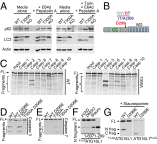Atg16L1 T300A variant decreases selective autophagy resulting in altered cytokine signaling and decreased antibacterial defense
- PMID: 24821797
- PMCID: PMC4040621
- DOI: 10.1073/pnas.1407001111
Atg16L1 T300A variant decreases selective autophagy resulting in altered cytokine signaling and decreased antibacterial defense
Abstract
A coding polymorphism (Thr300Ala) in the essential autophagy gene, autophagy related 16-like 1 (ATG16L1), confers increased risk for the development of Crohn disease, although the mechanisms by which single disease-associated polymorphisms contribute to pathogenesis have been difficult to dissect given that environmental factors likely influence disease initiation in these patients. Here we introduce a knock-in mouse model expressing the Atg16L1 T300A variant. Consistent with the human polymorphism, T300A knock-in mice do not develop spontaneous intestinal inflammation, but exhibit morphological defects in Paneth and goblet cells. Selective autophagy is reduced in multiple cell types from T300A knock-in mice compared with WT mice. The T300A polymorphism significantly increases caspase 3- and caspase 7-mediated cleavage of Atg16L1, resulting in lower levels of full-length Atg16Ll T300A protein. Moreover, Atg16L1 T300A is associated with decreased antibacterial autophagy and increased IL-1β production in primary cells and in vivo. Quantitative proteomics for protein interactors of ATG16L1 identified previously unknown nonoverlapping sets of proteins involved in ATG16L1-dependent antibacterial autophagy or IL-1β production. These findings demonstrate how the T300A polymorphism leads to cell type- and pathway-specific disruptions of selective autophagy and suggest a mechanism by which this polymorphism contributes to disease.
Conflict of interest statement
The authors declare no conflict of interest.
Figures




References
-
- Saitoh T, et al. Loss of the autophagy protein Atg16L1 enhances endotoxin-induced IL-1beta production. Nature. 2008;456(7219):264–268. - PubMed
Publication types
MeSH terms
Substances
Grants and funding
LinkOut - more resources
Full Text Sources
Other Literature Sources
Medical
Molecular Biology Databases
Research Materials

